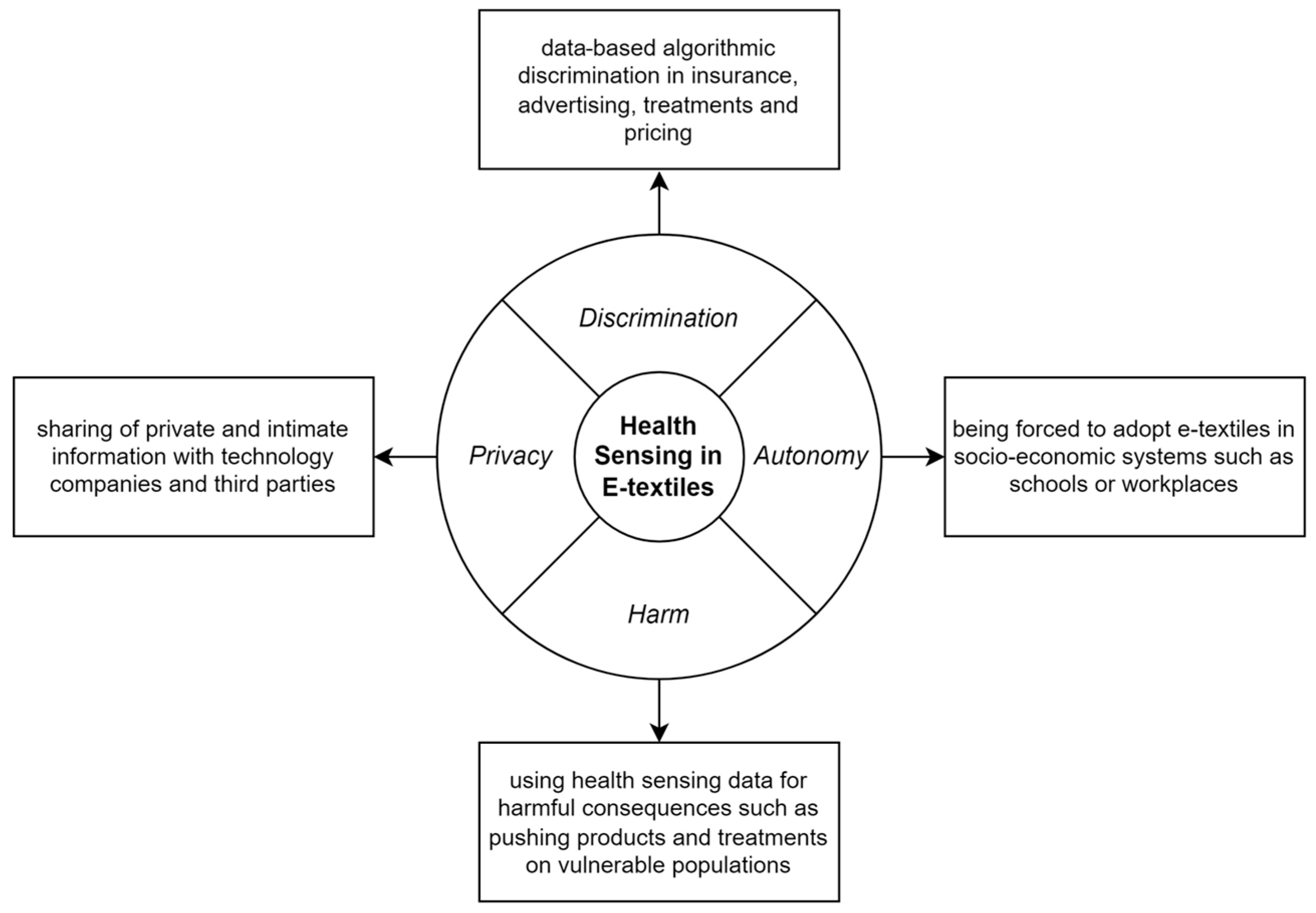Ethical Aspects of Health Sensing Applications in E-Textiles †
Abstract
1. Introduction
2. Background
3. Ethical Aspects of Health Sensing Applications in E-Textiles
3.1. Privacy
3.2. Discrimination
3.3. Autonomy
3.4. Harm
4. Discussion and Conclusions
Author Contributions
Funding
Institutional Review Board Statement
Informed Consent Statement
Data Availability Statement
Conflicts of Interest
References
- Fernández-Caramés, T.M.; Fraga-Lamas, P. Towards the Internet of Smart Clothing: A Review on IoT Wearables and Garments for Creating Intelligent Connected E-Textiles. Electronics 2018, 7, 405. [Google Scholar] [CrossRef]
- Yang, K.; Isaia, B.; Brown, L.J.E.; Beeby, S. E-Textiles for Healthy Ageing. Sensors 2019, 19, 4463. [Google Scholar] [CrossRef] [PubMed]
- Mertz, L. E-Textiles for Health Monitoring: Off to a Slow Start, but Coming Soon. IEEE Pulse 2020, 11, 11–20. [Google Scholar] [CrossRef] [PubMed]
- Lupton, D. M-health and health promotion: The digital cyborg and surveillance society. Soc. Theory Health 2012, 10, 229–244. [Google Scholar] [CrossRef]
- Wieczorek, M.; O’Brolchain, F.; Saghai, Y.; Gordijn, B. The ethics of self-tracking. A comprehensive review of the literature. Ethics Behav. 2022. [Google Scholar] [CrossRef]
- Sharon, T. Self-Tracking for Health and the Quantified Self: Re-Articulating Autonomy, Solidarity, and Authenticity in an Age of Personalized Healthcare. Philos. Technol. 2017, 30, 93–121. [Google Scholar] [CrossRef]
- Ahuja, S.; Kumar, J. Surveillance based Persuasion: The Good, the Bad and the Ugly. In Proceedings of the 4th International Conference on Computer-Human Interaction Research and Applications (CHIRA 2020), Budapest, Hungary, 5–6 November 2020; pp. 120–127. [Google Scholar] [CrossRef]
- McFall, L. Personalizing solidarity? The role of self-tracking in health insurance pricing. Econ. Soc. 2019, 48, 52–76. [Google Scholar] [CrossRef] [PubMed]
- Chung, C.; Gorm, N.; Shklovski, I.A.; Munson, S. Finding the Right Fit: Understanding Health Tracking in Workplace Wellness Programs. In Proceedings of the 2017 CHI Conference on Human Factors in Computing Systems (CHI 2017), Denver, CO, USA, 6–11 May 2017; pp. 4875–4886. [Google Scholar] [CrossRef]
- Ahuja, S.; Kumar, J. Assistant or Master: Envisioning the User Autonomy Implications of Virtual Assistants. In Proceedings of the 4th Conference on Conversational User Interfaces (CUI 2022), Glasgow, UK, 26–28 July 2022. [Google Scholar] [CrossRef]
- Wessel, M.; Helmer, N. A Crisis of Ethics in Technology Innovation. MIT Sloan Management Review. 2020. Available online: https://sloanreview.mit.edu/article/a-crisis-of-ethics-in-technology-innovation/ (accessed on 2 December 2022).

Disclaimer/Publisher’s Note: The statements, opinions and data contained in all publications are solely those of the individual author(s) and contributor(s) and not of MDPI and/or the editor(s). MDPI and/or the editor(s) disclaim responsibility for any injury to people or property resulting from any ideas, methods, instructions or products referred to in the content. |
© 2023 by the authors. Licensee MDPI, Basel, Switzerland. This article is an open access article distributed under the terms and conditions of the Creative Commons Attribution (CC BY) license (https://creativecommons.org/licenses/by/4.0/).
Share and Cite
Ahuja, S.; Kumar, J. Ethical Aspects of Health Sensing Applications in E-Textiles. Eng. Proc. 2023, 30, 4. https://doi.org/10.3390/engproc2023030004
Ahuja S, Kumar J. Ethical Aspects of Health Sensing Applications in E-Textiles. Engineering Proceedings. 2023; 30(1):4. https://doi.org/10.3390/engproc2023030004
Chicago/Turabian StyleAhuja, Sanju, and Jyoti Kumar. 2023. "Ethical Aspects of Health Sensing Applications in E-Textiles" Engineering Proceedings 30, no. 1: 4. https://doi.org/10.3390/engproc2023030004
APA StyleAhuja, S., & Kumar, J. (2023). Ethical Aspects of Health Sensing Applications in E-Textiles. Engineering Proceedings, 30(1), 4. https://doi.org/10.3390/engproc2023030004





